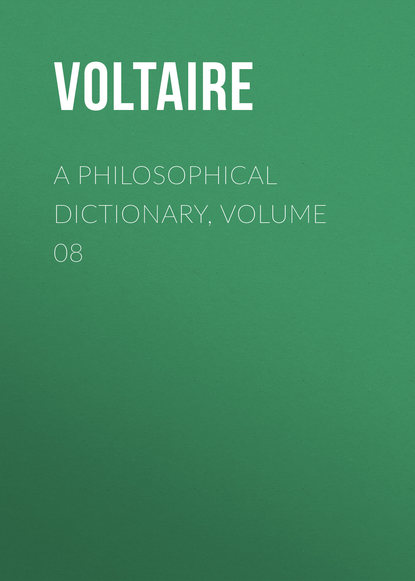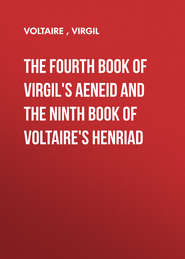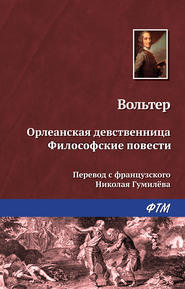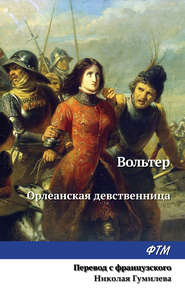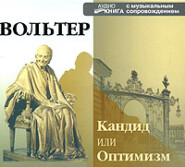По всем вопросам обращайтесь на: info@litportal.ru
(©) 2003-2024.
✖
A Philosophical Dictionary, Volume 08
Настройки чтения
Размер шрифта
Высота строк
Поля
What I should myself have said to Zoroaster would have been this: My reason opposes the admission of two gods in conflict with each other; such an idea is allowable only in a poem in which Minerva quarrels with Mars. My weak understanding much more readily acquiesces in the notion of only one Great Being, than in that of two great beings, of whom one is constantly counteracting and spoiling the operations of the other. Your evil principle, Arimanes, has not been able to derange a single astronomical and physical law established by the good principle of Oromazes; everything proceeds, among the numberless worlds which constitute what we call the heavens, with perfect regularity and harmony; how comes it that the malignant Arimanes has power only over this little globe of earth?
Had I been Arimanes, I should have assailed Oromazes in his immense and noble provinces, comprehending numbers of suns and stars. I should never have been content to confine the war to an insignificant and miserable village. There certainly is a great deal of misery in this same village; but how can we possibly ascertain that it is not absolutely inevitable?
You are compelled to admit an intelligence diffused through the universe. But in the first place, do you absolutely know that this intelligence comprises a knowledge of the future? You have asserted a thousand times that it does; but you have never been able to prove it to me, or to comprehend it yourself. You cannot have any idea how any being can see what does not exist; well, the future does not exist, therefore no being can see it. You are reduced to the necessity of saying that he foresees it; but to foresee is only to conjecture.
Now a god who, according to your system, conjectures may be mistaken. He is, on your principles, really mistaken; for if he had foreseen that his enemy would poison all his works in this lower world, he would never have produced them; he would not have been accessory to the disgrace he sustains in being perpetually vanquished.
Secondly, is he not much more honored upon my hypothesis, which maintains that he does everything by the necessity of his own nature, than upon yours, which raises up against him an enemy, disfiguring, polluting, and destroying all his works of wisdom and kindness throughout the world!
In the third place, it by no means implies a mean and unworthy idea of God to say that, after forming millions of worlds, in which death and evil may have no residence, it might be necessary that death and evil should reside in this.
Fourth, it is not deprecating God to say that He could not form man without bestowing on him self-love; that this self-love could not be his guide without almost always leading him astray; that his passions are necessary, but at the same time noxious; that the continuation of the species cannot be accomplished without desires; that these desires cannot operate without exciting quarrels; and that these quarrels necessarily bring on wars, etc.
Fifth, on observing a part of the combinations of the vegetable, animal, and mineral kingdoms, and the porous nature of the earth, in every part so minutely pierced and drilled like a sieve, and from which exhalations constantly rise in immense profusion, what philosopher will be bold enough, what schoolman will be weak enough, decidedly to maintain that nature could possibly prevent the ravages of volcanoes, the intemperature of seasons, the rage of tempests, the poison of pestilence, or, in short, any of those scourages which afflict the world?
Sixth, a very great degree of power and skill are required to form lions who devour bulls, and to produce men who invent arms which destroy, by a single blow, not merely the life of bulls and lions, but – melancholy as the idea is – the life of one another. Great power is necessary to produce the spiders which spread their exquisitely fine threads and net-work to catch flies; but this power amounts not to omnipotence – it is not boundless power.
In the seventh place, if the Supreme Being had been infinitely powerful, no reason can be assigned why He should not have made creatures endowed with sensation infinitely happy; He has not in fact done so; therefore we ought to conclude that He could not do so.
Eighth, all the different sects of philosophers have struck on the rock of physical and moral evil. The only conclusion that can be securely reached is, that God, acting always for the best, has done the best that He was able to do.
Ninth, this necessity cuts off all difficulties and terminates all disputes. We have not the hardihood to say: "All is good"; we say: "There is no more evil than was absolutely inevitable."
Tenth, why do some infants die at the mother's breast? Why are others, after experiencing the first misfortune of being born, reserved for tormentes as lasting as their lives, which are at length ended by an appalling death? Why has the source of life been poisoned throughout the world since the discovery of America? Why, since the seventh century of the Christian era, has the smallpox swept away an eighth portion of the human species? Why, in every age of the world, have human bladders been liable to be converted into stone quarries? Why pestilence, and war, and famine, and the Inquisition? Consider the subject as carefully, as profoundly, as the powers of the mind will absolutely permit, you will find no other possible solution than that all is necessary.
I address myself here solely to philosophers, and not to divines. We know that faith is the clue to guide us through the labyrinth. We know full well that the fall of Adam and Eve, original sin, the vast power communicated to devils, the predilection entertained by the Supreme Being for the Jewish people, and the ceremony of baptism substituted for that of circumcision, are answers that clear up every difficulty. We have been here arguing only against Zoroaster, and not against the University of Coimbra, to whose decisions and doctrines, in all the articles of our work, we submit with all possible deference and faith. See the letters of Memmius to Cicero; and answer them if you can.
POWER
The Two Powers
SECTION I
Whoever holds both the sceptre and the censer has his hands completely occupied. If he governs a people possessed of common sense he may be considered as a very able man; but if his subjects have no more mind than children or savages, he may be compared to Bernier's coachman, who was one day suddenly surprised by his master in one of the public places of Delhi, haranguing the populace, and distributing among them his quack medicines. "What! Lapierre," says Bernier to him, "have you turned physician?" "Yes, sir," replied the coachman; "like people, like doctor."
The dairo of the Japanese, or the grand lama of Thibet, might make just the same remark. Even Numa Pompilius, with his Egeria, would have answered Bernier in the same manner. Melchizedek was probably in a similar situation, as well as the Anius whom Virgil introduces in the following two lines of the third book of his "Æneid":
Rex Anius, rex idem hominum Phœbique sacerdos,
Vittis et sacra redimitus tempora lauro. – VIRGIL.
Anius, the priest and king, with laurel crowned
His hoary locks with purple fillets bound. – DRYDEN.
This charlatan Anius was merely king of the isle of Delos, a very paltry kingdom, which, next to those of Melchizedek and Yvetot, was one of the least considerable in the world; but the worship of Apollo had conferred on it a high reputation; a single saint is enough to raise any country into credit and consequence.
Three of the German electors are more powerful than Anius, and, like him, unite the rights of the mitre with those of the crown; although in subordination, at least apparently so, to the Roman emperor, who is no other than the emperor of Germany. But of all the countries in which the plenitude of ecclesiastical and the plenitude of royal claims combine to form the most full and complete power that can be imagined, modern Rome is the chief.
The pope is regarded in the Catholic part of Europe as the first of kings and the first of priests. It was the same in what was called "pagan" Rome; Julius Cæsar was at once chief pontiff, dictator, warrior, and conqueror; distinguished also both for eloquence and gallantry; in every respect the first of mankind; and with whom no modern, except in a dedication, could ever be compared.
The king of England, being the head also of the Church, possesses nearly the same dignities as the pope. The empress of Russia is likewise absolute mistress over her clergy, in the largest empire existing upon earth. The notion that two powers may exist, in opposition to each other, in the same state, is there regarded even by the clergy themselves as a chimera equally absurd and pernicious.
In this connection I cannot help introducing a letter which the empress of Russia, Catherine II., did me the honor to write to me at Mount Krapak, on Aug. 22, 1765, and which she permitted me to make use of as I might see occasion:
"The Capuchins who are tolerated at Moscow (for toleration is general throughout the Russian empire, and the Jesuits alone are not suffered to remain in it), having, in the course of the last winter, obstinately refused to inter a Frenchman who died suddenly, under a pretence that he had not received the sacraments, Abraham Chaumeix drew up a factum, or statement, against them, in order to prove to them that it was obligatory upon them to bury the dead. But neither this factum, nor two requisitions of the governor, could prevail on these fathers to obey. At last they were authoritatively told that they must either bury the Frenchman or remove beyond the frontiers. They actually removed accordingly; and I sent some Augustins from this place, who were somewhat more tractable, and who, perceiving that no trifling or delay would be permitted, did all that was desired on the occasion. Thus Abraham Chaumeix has in Russia become a reasonable man; he absolutely is an enemy to persecution; were he also to become a man of wit and intellect, he would make the most incredulous believe in miracles; but all the miracles in the world will not blot out the disgrace of having been the denouncer of the 'Encyclopædia.'
"The subjects of the Church, having suffered many, and frequently tyrannical, grievances, which the frequent change of masters very considerably increased, towards the end of the reign of the empress Elizabeth, rose in actual rebellion; and at my accession to the throne there were more than a hundred thousand men in arms. This occasioned me, in 1762, to execute the project of changing entirely the administration of the property of the clergy, and to settle on them fixed revenues. Arsenius, bishop of Rostow, strenuously opposed this, urged on by some of his brother clergy, who did not feel it perfectly convenient to put themselves forward by name. He sent in two memorials, in which he attempted to establish the absurd principle of two powers. He had made the like attempt before, in the time of the empress Elizabeth, when he had been simply enjoined silence; but his insolence and folly redoubling, he was now tried by the metropolitan of Novgorod and the whole synod, condemned as a fanatic, found guilty of attempts contrary to the orthodox faith, as well as to the supreme power, deprived of his dignity and priesthood, and delivered over to the secular arm. I acted leniently towards him; and after reducing him to the situation of a monk, extended his punishment no farther."
Such are the very words of the empress; and the inference from the whole case is that she well knows both how to support the Church and how to restrain it; that she respects humanity as well as religion; that she protects the laborer as well as the priest; and that all orders in the state ought both to admire and bless her.
I shall hope to be excused for the further indiscretion of transcribing here a passage contained in another of her letters, written on November 28, 1765:
"Toleration is established among us; it constitutes a law of the state; persecution is prohibited. We have indeed fanatics who, as they are not persecuted by others, burn themselves; but if those of other countries also did the same, no great harm could result; the world, in consequence of such a system, would have been more tranquil, and Calas would not have been racked to death."
Do not imagine that she writes in this style from a feeling of transient and vain enthusiasm, contradicted afterwards in her practice, nor even from a laudable desire of obtaining throughout Europe the suffrages and applause of those who think, and teach others the way to think. She lays down these principles as the basis of her government. She wrote with her own hand, in the "Council of Legislations," the following words, which should be engraved on the gates of every city in the world:
"In a great empire, extending its sway over as many different nations as there are different creeds among mankind, the most pernicious fault would be intolerance."
It is to be observed that she does not hesitate to put intolerance in the rank of faults – I had nearly said offences. Thus does an absolute empress, in the depths of the North, put an end to persecution and slavery – while in the South – .
Judge for yourself, sir, after this, whether there will be found a man in Europe who will not be ready to sign the eulogium you propose. Not only is this princess tolerant, but she is desirous that her neighbors should be so likewise. This is the first instance in which supreme power has been exercised in establishing liberty of conscience. It constitutes the grandest epoch with which I am acquainted in modern history.
The case of the ancient Persians forbidding the Carthaginians to offer human sacrifices is a somewhat similar instance. Would to God, that instead of the barbarians who formerly poured from the plains of Scythia, and the mountains of Imaus and Caucasus, towards the Alps and Pyrenees, carrying with them ravage and desolation, armies might be seen at the present day descending to subvert the tribunal of the Inquisition – a tribunal more horrible than even the sacrifices of human beings which constitute the eternal reproach of our forefathers.
In short, this superior genius wishes to convince her neighbors of what Europe is now beginning to comprehend, that metaphysical unintelligible opinions, which are the daughters of absurdity, are the mothers of discord; and that the Church, instead of saying: "I come to bring, not peace, but the sword," should exclaim aloud: "I bring peace, and not the sword." Accordingly the empress is unwilling to draw the sword against any but those who wish to crush the dissidents.
SECTION II
Conversation Between The Reverend Father Bouvet, Missionary Of The Company Of Jesus, And The Emperor Camhi, In The Presence Of Brother Attiret, A Jesuit; Extracted From The Private Memoirs Of The Mission, In 1772
FATHER BOUVET
Yes, may it please your sacred majesty, as soon as you will have had the happiness of being baptized by me, which I hope will be the case, you will be relieved of one-half of the immense burden which now oppresses you. I have mentioned to you the fable of Atlas, who supported the heavens on his shoulders. Hercules relieved him and carried away the heavens. You are Atlas, and Hercules is the pope. There will be two powers in your empire. Our excellent Clement will be the first. Upon this plan you will enjoy the greatest of all advantages; those of being at leisure while you live, and of being saved when you die.
THE EMPEROR
I am exceedingly obliged to my dear friend, the pope, for condescending to take so much trouble; but how will he be able to govern my empire at the distance of six thousand leagues?
FATHER BOUVET
Nothing, may it please your Imperial Majesty, can be more easy. We are his vicars apostolic, and he is the vicar of God; you will therefore be governed by God Himself.
THE EMPEROR
How delightful that will be! I am not, however, quite easy on the subject. Will your vice-god share the imperial revenues with myself? For all labor ought to be paid for.
FATHER BOUVET
Our vice-god is so kind and good that in general he will not take, at most, more than a quarter, except in cases of disobedience. Our emoluments will not exceed fifty million ounces of pure silver, which is surely a trifling object in comparison with heavenly advantages.





